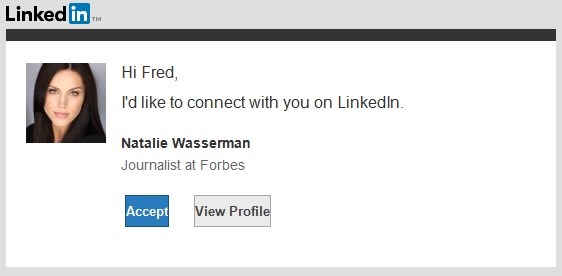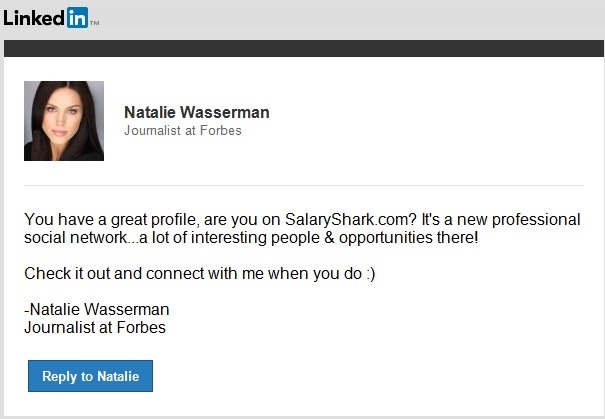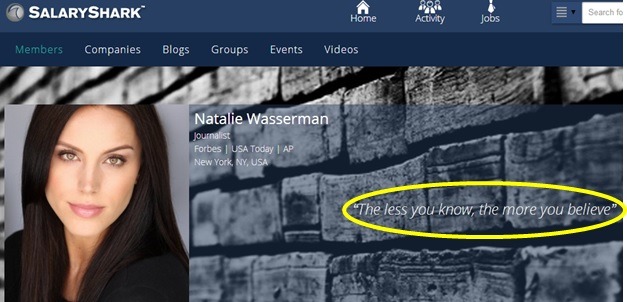That is the question, and one that Lori Lewis gets asked a lot.
After all, stations are aggregating likes, followers, and connections at a rapid rate. Why shouldn’t they monetize them?
And in fact, there are ways to motivate and engage these socialized consumers. But there are also downside risks that come into play as well, some of which are corrosive to brands.
Last week, I received a nice LinkedIn invitation from Natalie Wasserman, and as you can see below, she’s a journalist with Forbes. So what’s not to like here? We’re in the midst of publicizing our sixth Public Radio Techsurvey, jacapps was just named the #2 mobile app developer in Michigan (behind global giant Compuware’s Lochbridge spinoff), DASH is coming up in just a few months, and we always have a lot to talk about.
So a media connection at Forbes? Looks good to me. Natalie, consider us connected!
But then 15 minutes later comes this:
Hmm…this journalist at Forbes wants me to join a new professional social network called SalaryShark.com? Suddenly, my relationship with Natalie feels like it’s changing. Yes, she’s pitching me stuff under the guise of wanting to have a media connection.
(I’ll save you the visit, plus why help their metrics, but) SalaryShark.com is a professional social network and they’re obviously buying the credibility of Forbes to hook people like me.
And it’s not just me.
Not long after I showed this to Lori, she brought this BuzzMachine blog post by Jeff Jarvis to my attention – “No Silver Bullets.”
Jeff does a great job of describing Forbes’ efforts to resuscitate its business. And in fact, just last week, Forbes Media sold a majority stake to a group of Asian investors for $475 million.
But along the way, Jarvis talks about how they opened up the journalistic floodgates to 1,000+ contributors to expand their content, but also to amp up their marketing efforts. Here’s the money line from his post:
Now, when I see a link to Forbes on Twitter, I don’t know whether it is going to take me to (1) the good work of a Forbes journalist, (2) the good work of a Forbes contributor, (3) the bad work of one of many Forbes contributors, or (4) the paid and wordy shilling of a Forbes advertiser, e.g.: Thus, I hesitate three beats before clicking on a Forbes link. That is the definition of a devalued media brand. And that is precisely what other media companies should fear as they more and more try to fool their readers into thinking that what we used to call advertising is now something else that can comfortably live under brands, enigmatically labeled.
And that sums up the problem – because when a legacy media brand like Forbes gets squishy socially, its entire credibility is at stake.
Marketers cannot put a price on this, but I can certainly tell you that as someone who does primary research for media brands like MTV, Vh1, and Comedy Central to Playboy and NPR, when you lose that trust factor with consumers, you’re in trouble.
And that gets amplified socially. The term “selling out” now sounds quaint in our supercharged new media world where everything is marketed, all the time, and to everyone.
In fact, some believe that it is no longer possible to sell out – that when extra points are sponsored, every brand essentially becomes a NASCAR vehicle that contains scores of advertiser logos.
But there’s a tipping point for heritage media brands that consumers have traditionally trusted – whether it’s Forbes, your local public radio station, or your station’s morning show
In this flurry to turn the corner, to transform media brands, and to cash in on the digital/social/mobile revolutions, there is price to pay for ham-handed strategies that leverage brands to scam, fool, and trick consumers.
In cleaning up this mini-mess, I went back into LinkedIn to remove the connection with Natalie, but she no longer appears in my “connections,” an apparition that was designed for one purpose only: to market to me under the umbrella of a journalistic contact.
So on a lark, I Googled her, and wouldn’t you know it – her SalaryShark profile came up. You’ll especially enjoy the irony of her slogan, big and bold in the middle of her page:
Someone’s got a sense of humor. And the joke is on Forbes.
Correction: Jeff Jarvis points out in a comment to this post that Forbes sold a majority stake at a valuation reported — by anonymous sources — to be $475 million. So they did not received that amount.
- Media And Technology In 2025: Believe It Or Not! - April 18, 2025
- In Radio, You Just Never Know - April 17, 2025
- The Secret To Making A Great Podcast (And Great Radio) - April 16, 2025







The same is true in public radio. Since 2003, we’ve conducted three major studies with NPR for the public radio system about the “Halo Effect” – the benefits sponsors receive when supporting public radio. They get more than ROI – they score big points with the audience for supporting something they love, and that connection and bond are strong.
The limitations placed on sponsorship credits in public radio are not only there for a reason, they provide public radio with something to offer sponsors that commercial media entities like Forbes cannot – the ability to trust a sponsor and place a higher value on them simply because of their support.
All media should take note.
I should have included that concept in the post especially given the release of Public Radio Techsurvey 6 which underscores the importance of the “Halo Effect” – something that is essentially non-existent in commercial radio. It’s a big reason why public radio has been able to succeed socially – that trust factor in the brand and what it stands for is a powerful thing. Thanks, Paul.
Thanks for the link.
A correction: They didn’t sell it for $475 million. They sold a majority stake at a valuation reported — by anonymous sources — to be that amount. So they did not get that much money.
Appreciate your article, Jeff, and the comment. I will add a correction to my post. Thanks again.
Fred,
Even more than what’s going on ‘socially’, your point “when extra points are sponsored, every brand essentially becomes a NASCAR vehicle” really struck a nerve with me. We know more than ever about the public’s intolerance for such overt shilling and yet stations continue to pile on more and more ‘sponsorship opportunities’ – as if not adding to the actual spot load, but adding more sponsor ID’s, is somehow more palatable. A local station has the studio named, the phone lines named, the time-check named and of course, the ubiquitous and connected-to-nothing CC ‘this report brought to you by…’ 15’s and their own sponsorship billboards all running amok and together during a break so that the ID’s become longer than any of the content they are allegedly sponsoring. How is that valuable for the listener or the advertisers? What ever happened to ‘less is more?’
How much clutter is too much clutter? It’s a great question, and at what point are listeners (of football fans) repelled? And your point about value is well-taken. When everything’s sponsored, what is the value? Thanks for the taking to time to add perspective, Mark.
I got a similar request last week on LinkedIn from someone purporting to do business development at Amazon. As soon as I accepted the connection, I got the same spam email. When I went to verify that she actually worked at Amazon by checking her LinkedIn profile, it had been deleted. It’s the first time I’ve been gamed like that with a request from a fake LinkedIn profile, and I’m sure it won’t be the last. Some sort of verification, similar to the Twitter verified accounts, would be a good call for LinkedIn!
Garrett, I couldn’t agree more. But the other side of this is the long-term damage to brands like Forbes and Amazon. I think there’s a side of this that thinks that brands of this magnitude wouldn’t pull stuff like this – only to find out they will. As Jeff Jarvis pointed out, it makes you think twice before you click a link from them. Ultimately, it is probably harmful to all media brands. Thanks for taking the time to tell your story.
I got one of these from Amazon on LinkedIn as well.. I don’t think it’s Forbes or Amazon, it seems like ultra-shady marketing tactics from SalaryShark. Compare these two profiles:
https://www.salaryshark.com/profile/233
https://www.salaryshark.com/profile/171
Tam, hard to say, but misrepresenting these companies is serious stuff. And yes, it’s ultra-shady.
Another one received today from WPP – clearly targeting advertising industry people – thank goodness I found this blog!
Appreciate it, Lauren.
Dear Fred and all;
Reading your comments, and thinking of the same messages coming to me; my mind is looking at the conspiracy theory:)
Could all this people here, guide to encrease sharksalary.com or this blog?:))
I m from Romania; a very small and poor country comparing with US, but this matter made us to think more and made more from nothing; so how can we think that the first impresion about a subject is the real one? If you play chees you learn to think about 7 or 8 moves, and this if only the second one!:)
Maibe i m just joking; maibe i m telling as a joke the true; but in the end, there are not such an amount of users in the world to satisfied the share holders, which are becoming more than users!:)
So, will we and to be, in online, more fishermans that fish!
Best regards,
Sorin Raia from Romania
I like the conspiracy theory myself. Thanks for writing, Sorin.
Seems to me, this is not about Forbes but about SalaryShark.
It is interesting that so many amazingly beautiful women, who work at companies with which one would be familiar, have LinkedIn profiles with very little information about themselves and they all send the same template for joining salaryshark via LinkedIn.
When you get to salaryshark, it is also interesting that there are three similarly model perfect women, on the front page, with similar backgrounds being utilized as examples of who to find there.
All of these elements came together for me instantly,in creating absolutely no interest in signing up for a business networking site that needs to use sexy pictures of perfect women with fake profiles to entice one to sign up
If that’s all they got, they dont have much!
No argument here. Sales dependent on babes has always been shaky. I especially grimace at auto shows where half of new car buyers are women, and yet, the models continue to represent brand after brand. Maybe that’s a topic for DASH. Thanks, Eli.
Same spam received, thanks for sharing and warning! https://salaryshark.com/profile/182
No problem. Thanks, Pat.
Same thing happened to me! I did reply to this person (who claims being from Monster) and she replied back.. so I simply asked her what this was all about…
expecting her answer..
Yup, looks like this is the way it works.
Same thing just happened to me. First a man named Jax Kamerun sent an Linkedin invitation to me. His profile on the Linkedin invitation email says he is a Social & Digital Marketing Manager at Yahoo. So, that was pretty impressive. But, after I searched for his name on Linkedin, I found that his profile was deleted (or error by some reason) plus I had no invitation pending on my Linkedin app, I started to smell something…
I looked up on this email again, it is from [email protected] which I believe is a genuine invitation sent from Linkedin (it should be [email protected], I think).
So, I replied to where it was sent from ([email protected]) by saying that his Linkedin profile doesn’t exist and the email [email protected] doesn’t look right to me.
Today, I’ve an email from him again! It is an invitation to join him on SalaryShark…
Personally, I think this is not an impressive way to obtain any kind of member. I did try to sign-up with SalaryShark barely because I want to know what it is. But things look fake and too much of ‘cosmetics’ there.
So, I deleted my account. All done with SalaryShark.
And the hits just keep on coming. Thanks, Thiwa.
Today Jax Kamerun seems to be moving to Amazon Web Services 😀
Hi efr,
Yes, I have an invitation from him and it says: “Jax Kamerun – Global IT Relationship Manager at Amazon Web Services”.
They tried to get me, too – Kathryn Morris, a Stanford Grad and Global Recruitment Manager at Apple invited me on LinkedIn, then the Salaryshark email came moments later. I go to write her back and alas, her profile on LinkedIn is having issues, but a BS profile is on Salaryshark – “High expectations are the key to absolutely everything”. I like the almost ripped off photo of the taxi from LinkedIn, too.
It reminds me of the fake Apple Store in China – LOL – no thanks, “Kathryn”.
Ha! Just got the exact same wording in a follow up to a connection request on LinkedIn. “Person”claimed to be working at Miami Dolphins.
Amazing how this post lives on. Thanks, Des.
Today Jax Kamerun seems to be moving to AWS in London. Great career, even for a fake profile – if it is.
Just sent an email after the invitation, with a single question “are you a real person?” but no answer so far. Stay tuned.
It goes on!
Fred,
Echoing the comment thread here. Glad I found your article…all I did was enter Salary Shark reviews into a Google search and pretty high up was a link to your blog post. Couldn’t believe what I saw – exact same wording/formatting. Mine was from Tory Burch.
After accepting her LI invite to connect, I replied to this Gina Denapoli saying I thought it was spam and that I made a screen grab to report. I got a near instant reply back from “her” saying it isn’t spam, that she’s sorry to have bothered me, it’s a new network, etc. So I replied with a no worries but included a link to your article along with a few words to explain why I was questioning. She almost had me convinced. But the communication stopped there. When I went back to screen grab the exchange, it’s missing. Her profile is still there and the first SalaryShark.com invite but nothing else.
My question here is why is no one pointing a finger at LinkedIn here…for not having more stringent criteria for joining and vetting profiles. Am I missing something here? I’m not a SM expert by any stretch but it seems Salary Shark is using/hacking LI to fish for invites and the posing companies (Forbes, Amazon, Tory Burch…) may be the real victims of the hack?
Thoughts?
Thanks, Anthea
correction: the exchange IS all there after all. Her exact reply was:
“Hi Anthea, it’s not spam. I was just sharing it with a few of my colleagues. I apologize if I bothered you in any way.”
No answer yet to my having sent her the link to your post.
Anthea, when I wrote this post back in July, I had no idea it would continue to resonate six months later. I continue to hear from people like you who got caught up in the same apparent scam that I did. And as for your question about LinkedIn, it’s a good one and I don’t have the answer. I know what happened to me – and apparently, many other people – so I have to believe they’re aware this is going on. It is disappointing. Thanks for checking in and letting us know this is still occurring.
I received the same invite from Gina Denapoli who works for Tory Burch. Before venturing into a new network, I do my due diligence and Googled it, and your blog came up.
Thanks to this bit of information, I’ve now reported her as a spammer for http://www.salaryshark.com
Javier, thanks for the notification, and I’m glad that my post was helpful.
Hi Fred,
Six months later and this keeps happening. As it happened to Thiwa in October, I received an invitation in LinkedIn to connect with “Jax Kamerun – Global IT Relationship Manager at Amazon Web Services”. After accepting it, the same as everybody else happened: the profile disappears.
I’m with everyone else when I think that this is not the best way of getting new profiles on this site. For me it’s spam and I deleted my SalaryShark account.
Thank you for your post, Fred!!
Regards,
Carlos
And it goes on. Thanks, Carlos.
For the retail industry vets out there, watch for Christian Giroux. I accepted his invitation from the iPhone app so didn’t take the time to see how we were connected on LinkedIn. I accepted, like others did, merely on his job title. When I got the “spam” email, I immediately looked at his profile. Zero connections. Which is nearly impossible in any industry in which you’ve established a decade + career. This marketing strategy should be illegal.
Thanks, Kim. I love the name, but like so many of these, it doesn’t pass the smell test. Appreciate the comment.
Thank you Fred and Kim, very glad to have found this post. Christian Giroux sent me an invite request recently, his profile shows 500+ connections. I’m skeptical since I find no trace of him in industry news.